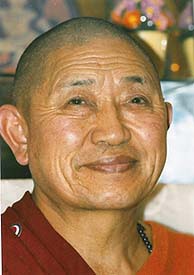I have been dealing with some personal and professional challenges of late (specifically, the balance between “work” and “life”) , and thought I’d pass along some helpful words from a set of teachings Sogyal Rinpoche gave at the Lerab Ling retreat center in 2010.
First, it’s important to remember that this existence of ours is called ‘samsara’ for a reason. Rinpoche reminded me that there are three types of suffering, and that we can’t simply hope or wish for suffering to vanish. “We’re speeding along, trying to get rid of suffering, but only experiencing more suffering as part of that process.” Duhkha, or “suffering” in Sanskrit, has also been translated by some of the teachers as “frustration” or “stress,” which seems quite apt for the modern world.
My own experience has taught me that the first step in dealing with my current situation is to acknowledge the universality of suffering. “Suffering is our constant companion,” Rinpoche said. “…As long as you’re in samsara, it’s never where everything is right.”
I’m amazed that the recognition of this fact sometimes evades me. I occasionally retreat into a mindset where I daydream about the world as I think it should be — a place free of suffering, where every being willingly lives life to his or her full potential. Civility abounds, and right always triumphs over wrong. The good prevail, and the guy who runs the stop sign and nearly hits your car will find punishment that leads to wholehearted redemption.
But that’s not reality. No matter what I do, there will always be someone running the stop sign, or doing things that create deep frustration in my professional life. “Once you accept, actually, that suffering is a natural part of samsara, once you accept this then it is better. When you don’t accept, then it becomes really aggravating,” Rinpoche said. As proof, he offered the story of Garchen Rinpoche, a Kagyu master who spent 20 years in a Chinese prison during the Cultural Revolution. Rather than letting this experience break him, Garchen Rinpoche accepted that his suffering was part of his karma, and in fact attained a great deal of wisdom insight as a result of the imprisonment. As Sogyal Rinpoche explained,
“If you face the suffering, you think, ‘It will become worse.’ But no, it will become better. …There is a certain part of [samsara] that you just have to accept. Accept, accept and then you … rise above that, and not be depressed by that. You simply accept [samsara] as a natural part [of life].”
Now that I’ve been reminded for the umpteenth time that I have to stop resisting the fact that suffering is an innate part of existence, what should I do? He told me not to focus on my frustration, but to instead put my mind on something positive, or even inspiring. Clear the crap you are dwelling on out of your head and put something better in there to replace it. “Just as fire and water cannot exist at the same time…if you have a positive thought, the negative thought cannot exist with it.”
Quoting Buddha, Rinpoche reminded me of the relativity of how we perceive our existence. “All that we are arises with our thoughts. With our thoughts, we make the world. Speak or act with pure mind and happiness follows.” To put that another way: Mind is pure; whatever you occupy it with, it becomes. Period.
 Enter meditation practice. Through meditation, I am learning to create the mental space required to be in the present moment — to detach myself from the non-stop play of stories and dialogues in my mind. To recognize that I am not my thoughts, and that I am not my emotions. It is, as Rinpoche says, all a matter of mental training.
Enter meditation practice. Through meditation, I am learning to create the mental space required to be in the present moment — to detach myself from the non-stop play of stories and dialogues in my mind. To recognize that I am not my thoughts, and that I am not my emotions. It is, as Rinpoche says, all a matter of mental training.
Watching these teachings, I have a few ideas about how to ensure that I focus on the positive during the work day, accepting the turbulence that is part and parcel of human life with a sense of forgiveness for myself, and smile for those around me and a real sense of hope for my future. And rather than beat myself up for getting stuck in the same rut every time I wind up in this situation, I remind myself that the beginner’s mind is always full of possibilities, and that few things can be better than to approach life with that mindset.
(The teachings I reference in this post are available from the Zam America bookstore online by clicking here.)

